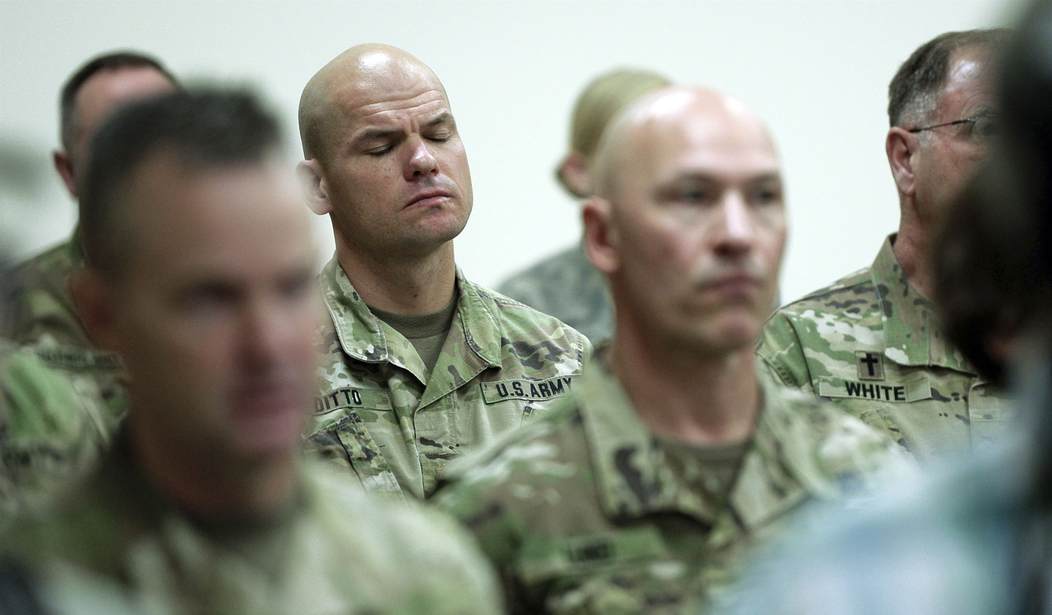Congress is working through the National Defense Authorization Act (NDAA) this month that will end up authorizing programs to map out military policy for the next year. One area that needs addressing in the NDAA are the substandard living conditions in accompanied and unaccompanied military housing. The NDAA should be a way for Congress to help an overextended military that fights to defend America every day provide decent living conditions for our service members and their families.
The General Accounting Office (GAO) recently conducted a study of military housing following “reports of poor living conditions in government-owned barracks and military family housing owned and operated by private companies [that] raised questions about DOD’s oversight of its military housing program.” The GAO noted that “[p]oor living conditions in military housing decrease quality of life for service members and their families and can negatively affect military readiness.” Military personnel are asked to defend America, yet face health and safety hazards in their homes, including air and water contamination. Congress can fix this.
There are strategies being implemented in the private sector that can improve the quality of life for our service members and help address the recruitment challenges faced by the Armed Services. Back in the mid-90s, the Military Housing Privatization Initiative was established to revitalize military housing communities across the United States by partnering with private sector companies. According to the Military Housing Association, the initiative has “delivered the construction of more than 75,000 new homes and major renovations to 50,000 additional homes to date” while saving “taxpayers billions of dollars by leveraging $4 billion in government funding into more than $32 billion in total private funding and development for a portfolio of over 200,000 homes.” Privatization is demonized by many progressives, yet, in the specific case of military housing, it has proven a great tool to help upgrade the living conditions for the military.
Recommended
Corvias, a large private military housing provider, recently announced that it will be implementing housing upgrades to help improve indoor environmental conditions to meet certifiable standards for indoor health, with a focus on air, water and lighting quality, across its entire portfolio of 22,000 military family homes upon the Army’s approval. According to the company, Corvias has already successfully proven the benefits of the “seven-step program” across a representative sample of its family homes at Fort Meade, which demonstrated substantial quantifiable improvements in indoor air, water and light quality, measured against strict industry thresholds and standards for indoor health, demonstrating the significant benefit of rolling-out these upgrades across the portfolio. The program also generated “positive resident feedback, with 82% of participants expressing increased satisfaction with their on-post housing after implementation.”. Just this past week, members of the House Armed Services Committee sent a request to the Secretary of the Army, Christine Wormuth, specifically asking how proven programs, such as Corvias’ improvements at Fort Meade and Fort Liberty can be scaled across all housing, including barracks. These are exactly the types of actions we need to take to improve living conditions for our military personnel and place their health and well-being as a top priority
During debate over the FY2025 NDAA in the House Armed Service Committee back in May, Rep. Chrissy Houlahan (D-PA), a member of the House Armed Services Committee (HASC) and the Ranking Member of HASC’s military Quality of Life Panel, called for the Department of Defense to brief Congress on how it is improving indoor environmental conditions, including air, water and lighting quality, in military housing and buildings to support the health and well-being of our service members. This directive was offered as an amendment to the annual defense bill on a bipartisan basis with the support of Reps. Don Bacon (R-NE) and Jen Kiggans (R-VA). If this amendment is signed into law, the Pentagon will have until March 1, 2025 to meet the directive.
Our service members put their lives on the line to protect us. The least we can do is provide them with decent living conditions. Congress needs to do more to force the Pentagon to allocate additional resources to improving the living conditions for our military personnel and their families. At a time when taxpayers see tens of billions being shipped overseas to foreign nations, they want to see more of these dollars stay at home to take care of the men and women who protect our national security and preserve our rights and freedoms. Improvements in housing are clearly needed and the NDAA is an opportunity for the Pentagon to begin to address this critical issue.
























Join the conversation as a VIP Member